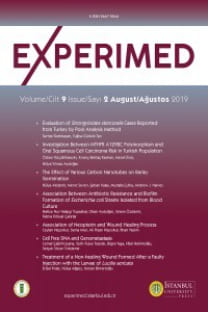İki Tilmikosin Preparatının Koyunlarda Biyoeşdeğerliği
Biyoeşdeğerlik, koyun, tilmikosin fosfat
Bioequivalence in the Sheep of Two Tilmicosin Preparations
Bioequivalence, sheep, tilmicosin phosphate,
___
- 1. Avcı T (2010): Sığırlarda Parenteral yolla uygulanan bazı makrolid grubu antibiyotiklerin sütteki seviyelerinin Belirlenmesi. (Doktora Tezi) s.29. 2. Caoa X-Y, Dongb M, Shen J-Z et al. Tilmicosin and tylosin have anti-inflammatory properties via modulation of COX-2 and iNOS gene expression and production of cytokines in LPS-induced macrophages and monocytes. Int J Antimicrob Agents 2006; 27: 431-8. 3. §EMEA (2001): Note for Guıdance on the investigation of bioavailability and Bioequivalence. Londra Committee for proprietary medicinal product (CPMP). 4. EMEA (2010). Guideline on the conduct of bioequivalence studies for veterinary medicinal products. Draft. Londra. Committee for Medicinal Products for Veterinary Use. 5. FAO (2006): Guidance for Industry Bioequivalence Guidance. U.S.A. Center for veterinary Medicine (CVM). 6. FDA (2005): Micotil 300. Freedom of information summary Supplemental New Animal Drug Application NADA 140-929. 7. Giguère S. (2006). Macrolides, Azalides, and Ketolides. 191-206. In: Prescott JF (Ed), Antimicrobial Therapy in Veterinary Medicine. Blackwell Publishing, US. 8. Kaya S. (2002). Makrolidler. 335-343. In: Kaya S, Pirinçci İ, Bilgili A (Ed), Veteriner Hekimliğinde Farmakoloji. Ankara Medisan Yayınevi, Ankara. 9. Lakritz J, Tyler JW, Marsh A, et al. Tilmicosin reduces lipopolysaccharide-stimulated bovine alveolar macrophage prostaglandin E(2) production via a mechanism involving phospholipases. Vet Ther 2002; 3: 7-21. 10. McNeil FD. Tilmicosin. Food &Drug Administration www.fao.org/docrep/w4601e/w4601e0e.html (10.04.2008). 11. Modric, S, Webb AI, Derendorf H. Pharmacokinetics and pharmacodynamics of tilmicosin in sheep and cattle. J Vet Pharmacol Therap 1998; 21: 444-52. 12. Moran JW, Turner JM, Coleman MR. Determination of tilmicosin in Bovine and Porcine Sera by Liquid Chromatography. J AOAC Int 1997; 80: 1183-9. 13. Naccari F, Giofre F, Pellegrino M, et al. Effectiveness and kinetic behavior of tilmicosin in the treatment of respiratory infections in sheep. Vet Rec 2001: 148; 773-6. 14. Ramadan A. Pharmacokinetics of tilmicosin in serum and milk of goats. Res Vet Sci 1997: 62; 48-50. 15. Rui P, Shen J, Li J, et al. The Pharmacokinetics of Tilmicosin administrated Intravenously and Subcutaneously in Healthy Sheep. Acta Veterinaria et Zootechnica Sinica 2005: 36; 296-300. 16. Shen J, Li C, Jiang H, et al. Pharmacokinetics of tilmicosin after oral administration in swine. AJVR 2005: 66; 1071-4. 17. Tountain PL, Koritz GD. Veterinary drug bioequivalence determination. J. Vet Pharmacol Therap 1997; 20: 79-90. 18. Zhang J, Li J, Miao X, et al. Pharmacokinetics of Tilmicosin in Sheep. Acta Veterinaria et Zootechnica Sinica 2004: 35; 560-4.
- Yayın Aralığı: Yılda 3 Sayı
- Başlangıç: 2011
- Yayıncı: İstanbul Üniversitesi
CD247 Genine Ait rs858554 ve rs704848 Polimorfizmlerinin İmmün Trombositopeni Hastalığı ile İlişkisi
İbrahim KUTLUBAY, Elif Gülsüm ÜMİT, Jülide TOZKIR
Fatma KÖKSAL ÇAKIRLAR, Sevilay YILDIZ, Okan AYDOĞAN, Sinem ÖZDEMİR, Sercan AKYOL ÇOLAKOĞLU, Zeynep TANER, Halit TOKMAN, Nevriye GÖNÜLLÜ
Evde Bakım Hastalarının Laboratuvar Özellikleri
Zeynep KARAALİ, Beste TACAL ASLAN, Mehmet Burak AKTUĞLU, Macit KOLDAŞ, Elif Sinem İPLİK, Bedia ÇAKMAKOĞLU
İki Tilmikosin Preparatının Koyunlarda Biyoeşdeğerliği
Resul KAHRAMAN, Veysel HANCER, Arzu ERGEN, Bedia ÇAKMAKOĞLU, Reyhan DİZ KÜÇÜKKAYA
Elif ŞAHİN, Nurten DAYIOĞLU, Baransel ÖKMEN, Ezgi KORKMAZ, Şevval BAYKARA, Gül BAKTIR
Osteointegre Dental İmplant Tedavisi Gören Hastalarda IL-1 β Genotipi ve Seviyelerinin İncelenmesi
Ferhat DİZEN, Uzay GÖRMÜŞ, Arzu ERGEN, Meral ÜNÜR, Elif Sinem İPLİK, Bedia ÇAKMAKOĞLU, Turgay İSBİR
